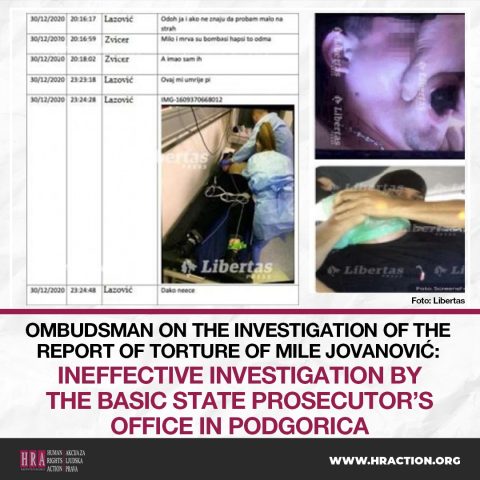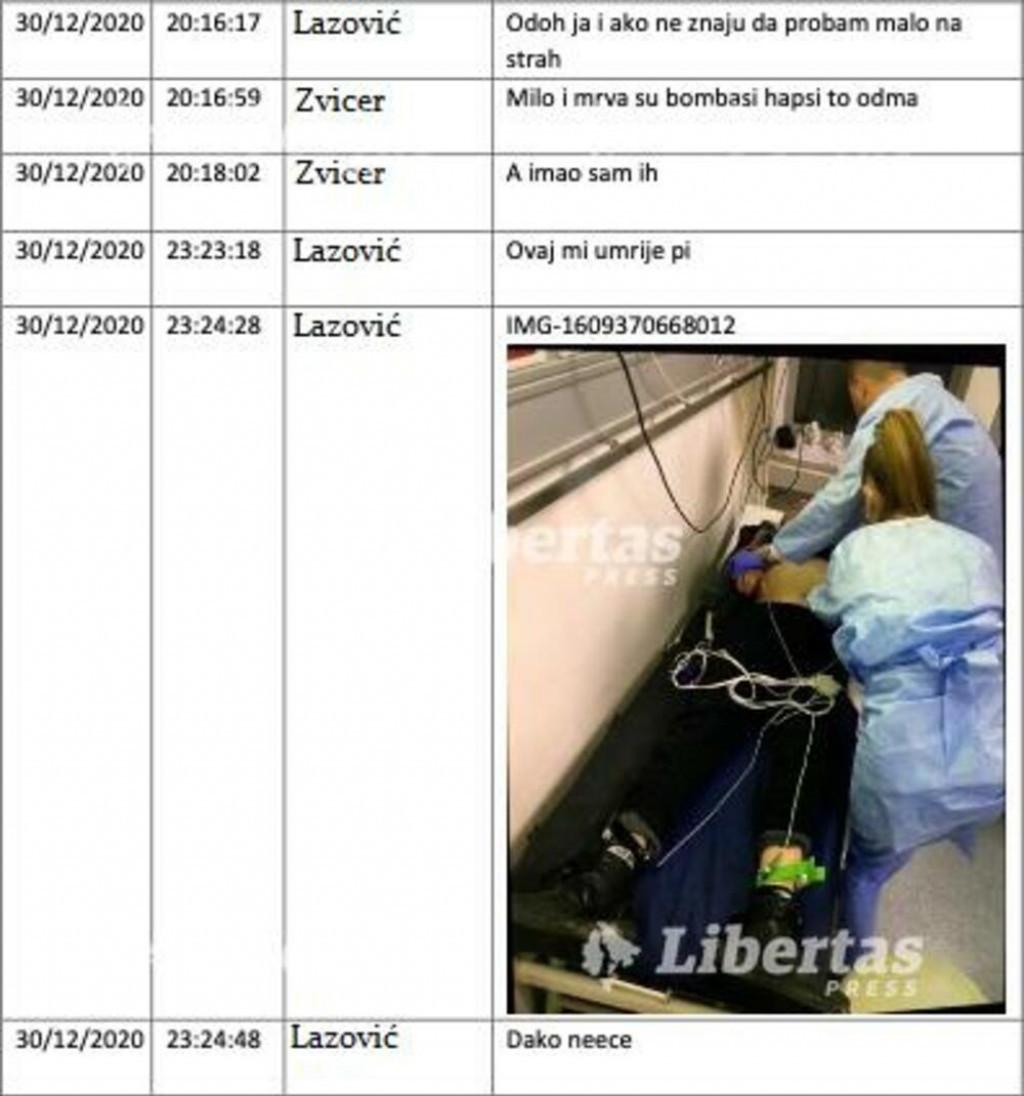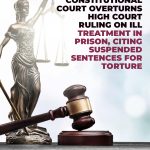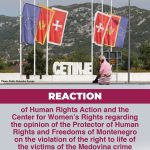
Alarmingly Low Turnout: Nine Applicants for 41 Intern Positions in Montenegrin Courts
02/04/2024
Report of the Special Rapporteur on the independence of judges and lawyers, Margaret Satterthwaite
12/04/2024OMBUDSMAN ON THE INVESTIGATION OF THE REPORT OF TORTURE OF MILE JOVANOVIĆ: INEFFECTIVE INVESTIGATION BY THE BASIC STATE PROSECUTOR’S OFFICE IN PODGORICA

In his opinion of 18 March 2024, the Protector of Human Rights and Freedoms of Montenegro (Ombudsman) concluded that “the ineffective investigation of the Basic State Prosecutor’s Office in the case of the ill-treatment of Mile Jovanović by the Sector for Combating Organised Crime and Corruption has violated Jovanović’s right to dignity and personal inviolability from Article 28 of the Constitution of Montenegro, i.e. the right to the prohibition of torture guaranteed by Article 3 of the European Convention”. The Ombudsman established that the investigation was conducted neither urgently nor thoroughly, and that the victim’s adequate participation in the proceedings was not ensured.
The subject of the control were the actions of the Basic State Prosecutor’s Office in Podgorica following a report that Mile Jovanović was ill-treated on the way from Nikšić to Podgorica on 30 December 2020 by being insulted, beaten and intimidated by police officers of the Sector for Combating Organised Crime and Corruption (SBPOKK).
Although the report was submitted to the Basic Prosecutor’s Office in Podgorica more than three years ago, on 5 January 2021, the case is still in the pre-investigation phase.

Jovanović’s allegations of ill-treatment were confirmed by the correspondence that was published by the Libertas portal in March 2023, after said correspondence was previously submitted to the Montenegrin authorities by EUROPOL as part of a file on encrypted communication between members of the Department for Special Operational Support of the Police Administration and members of the Kavač criminal clan.
The Ombudsperson ordered the State Prosecutor’s Office to take measures and actions appropriate for an effective investigation in this case, and obliged it to submit a report on undertaken actions within 30 days from the receipt of the Opinion.
The Human Rights Action hereby points out that the criterion of urgency in this case was irreparably violated, with serious consequences. The hesitation to urgently question the reported police officers and order the necessary expert examination was simply unacceptable. The correspondence about the torture of Jovanović has been circulating in the public for a year now; however, no one has been charged and no investigation been initiated against anyone to date. All of this points to the biased work of the prosecutor’s office, in favour of the suspected members of the police force.
Although in his first statement given to the prosecution Jovanović identified Petar Lazović as one of the persons who ill-treated him, Lazović was heard as a witness only 7 months after the alleged torture, and in the capacity of a suspect almost three years later, in November 2023.
Now, under new leadership, the State Prosecutor’s Office has a chance to prove that it is capable of conducting thorough investigations into allegations of police torture. Such investigations must be critically directed towards all competent members of the Police Administration, and they must show impartiality, which is required by international standards. The HRA asked in a timely fashion that cases opened based on reports of organised torture by police officers be handed over to the Special State Prosecutor’s Office, since the Basic Prosecutor’s Office in Podgorica had several serious failures in conducting effective investigations (as this case shows). Along with additional evidence, the HRA will submit the Ombudsman’s opinion to the Prosecutorial Council, with a complaint about the work of the state prosecutor of the Basic Prosecutor’s Office in Podgorica, Biljana Pavličić, who has been charged with the investigation in this case since the beginning.
Mile Jovanović is represented by attorney Milena Brnović, who is acting within the Human Rights Action support programme for victims of torture, financed by the UN Voluntary Fund for Victims of Torture.
“The fact that my client has not yet received even the status of injured party is quite incredible, which tells us that there is no end in sight to this procedure and that we are obviously still working in legal darkness”, said attorney Brnović.
Allegations of ill-treatment
After the Intervention Police in Nikšić stopped the vehicle that was transporting Mile Jovanović, Jovan Mrvaljević and Vladan Mijušković, and found a gun in it, the officers of the Security Department in Nikšić handed over Jovanović and Mrvaljević to members of the SBPOKK, who were charged with bringing them to Podgorica: Ivan Stamatović, Petar Lazović, Momo Mirković, Ivan Djoković, Željko Radunović, Neško Jaredić, Jugoslav Raičević, Dražen Marinović, Milorad Mitrović and Mirko Djukić.
According to the information of the Department for Internal Control of Police Work, police officers Ivan Stamatović, Petar Lazović and Momo Mirković were in the vehicle that was transporting Jovanović to Podgorica.
Jovanović claims that, on the way to Podgorica, they tied his hands with plastic clamps; that one of the police officers took out his encrypted telephone and asked him for the code; and that the same officer placed a collar around his neck and tightened it, using it to soften the blows so that no marks would be left in his neck area. When he told them that he did not want to open his telephone for security reasons, another officer allegedly elbowed him several times in the neck and throat region that was covered by the collar. In addition, he states that during the drive he suffered humiliation and threats of abuse directed at his pregnant sister, and that police officers constantly kept hitting him in the ribs, stomach and chest.
Jovanović further states that they stopped near Mareza, where another terrain vehicle came to a halt behind them, and he assumes that Jovan Mrvaljević was in it; that he saw that he (Mrvaljević) was in a crouched position by the back door and that several people were hitting him. Then, police officers pulled Jovanović out of the vehicle too. As per his testifimony, that is when Petar Lazović hit him with his fist in the stomach area, and then slapped him on the forehead; then, another police officer punched him in the chest area; after that, he was pushed into the vehicle and they continued moving towards Podgorica; they stopped briefly near the Clinical Centre of Montenegro, where he understood from the telephone conversation that Mrvaljević was being taken for medical assistance. After all this, four police officers interrogated Jovanović in the premises of the SBPOKK in Podgorica in the capacity of a citizen.
Four days after the alleged abuse (on 3 January 2021), in the article on portal Vijesti entitled “They accused SBPOKK of torture, the police claim that they were planning a murder”, Jovanović and Mrvaljević jointly made allegations about the suffered mental and physical ill-treatment. Two days later, a criminal report was filed with the Basic State Prosecutor’s Office in Podgorica. The case was opened, marked Ktr. no. 22/21, and assigned to prosecutor Biljana Pavličić. However, it is still in the pre-investigation phase, even though more than three years have passed since the submission of the report.
According to the opinion of the Deputy Ombudsman, Mirjana Radović, the investigation by the Basic State Prosecutor’s Office in Podgorica did not meet the criteria of effectiveness because it was not conducted urgently or thoroughly, and because no adequate participation of the victim was ensured in the course of the proceedings.
Urgency:
According to the Ombudsman’s findings, the acting prosecutor Pavličić took the first action in this case 10 days after the filing of the report, i.e. on 15 January 2021, when she verbally ordered that the above mentioned text from Vijesti be printed. She heard the injured party more than four months after the report was submitted, i.e. 13 May 2021, which is when Jovanović said that he had suffered physical injuries on the occasion in question, but that he had not gone to see a doctor. Petar Lazović, whom Jovanović identified while giving a statement as one of the officers who ill-treated him, was questioned more than two months later, on 22 July 2021.
On 28 October 2021, SBPOKK informed the prosecutor that the Internal Control Department of the Ministry of the Interior had opened a case concerning this event, and that the Basic State Prosecutor’s Office can contact them for all information. The prosecutor did so almost a month later, on 22 November 2021. The Department delivered the case file to her after 15 days, including an official note stating that Ivan Stamatović, Petar Lazović and Momo Mirković were in the car with Jovanović. However, Stamatović and Mirković were questioned only three months later, on 14 March 2022 (almost 15 months after the event).
Thoroughness:
According to the opinion of the Deputy Ombudsman, the fact that Jovanović was not heard in a timely fashion also led to omissions related to the medical examination, that is, an expert examination of possible physical injuries. In addition, the SBPOKK officers whom Jovanović saw in the official premises when he was brought there were not questioned in the proceedings either.
Victim’s involvement:
Jovanović was allowed to participate in the proceedings only after four months, when he was questioned by the prosecution. The Ombudsman also points out that there is no evidence in the case files that Jovanović was enabled to propose any action that might lead to him proving his claims, in terms of proactive action by the prosecution. No action related to identification, which might have been able to additionally clarify the allegations of ill-treatment, was carried out either.







 English
English Montenegrin
Montenegrin